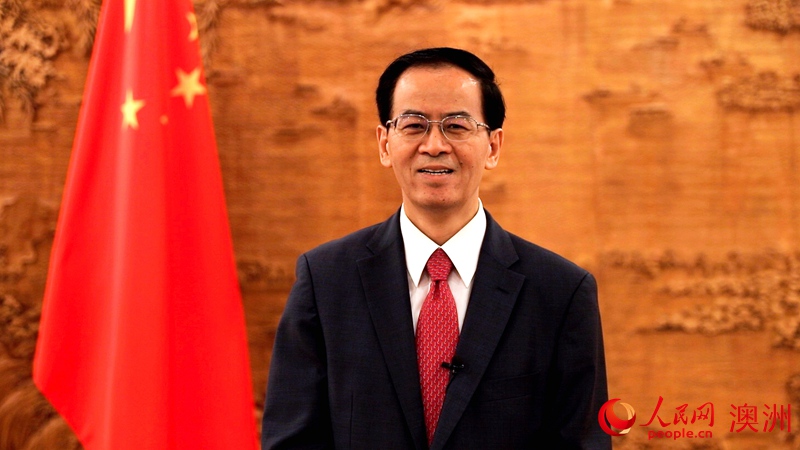Media Report

- The Wall Street Journal reports: "China's top Australia envoy accused critics of Beijing's influence in the country of trying to 'instigate China panic,' as calls mount for a probe into political donations from wealthy Chinese. Speaking at a conference Thursday meant to bring Chinese business leaders into contact with Australian lawmakers, China's ambassador to the country, Cheng Jingye, hit out at allegations of influence-buying by China-linked donors. 'In Chinese we call it cooking up the overnight cold rice, which means repeating the same stuff over and over,' he said. 'Those who have fabricated the allegations really have an imagination which is wild and morbid.' Fears of China's ability to potentially influence Australian policy through political donations have raised questions in Parliament over the country's economic reliance on China. In the year ended June 30, 2016, China accounted for almost a third of Australia's trade, valued at about 150 billion Australian dollars (US$113.8 billion). In comparison, trade flows with the U.S. were worth A$69.2 billion, although the U.S. remains the country's biggest investor."
- Quartz comments: "US president Donald Trump thinks the US is importing too much. He's threatened to block goods from several countries...China built up its industry to eventually become the world's top exporter, and according to a new paper from the US's National Bureau of Economic Research, the surprising key to that was to buy more from abroad, not less. The researchers started out trying to answer a very narrow question: How did China's entry into the World Trade Organization (WTO) benefit consumers in the US?...their work shows how manufacturers can benefit by importing the inputs they need to make their products—and how making those inputs more expensive, by raising tariffs, could hurt them...The study authors calculate that this effect—cheaper Chinese imports, and a wider variety of them—accounted for most of that 7.6% drop in prices of manufactured goods in the US...Also, it's true that simply increasing imports isn't an automatic prescription for helping domestic manufacturers. Some will benefit, but those that make inputs for them will suffer if those inputs can be imported more cheaply."
- The Financial Times reports: "At last month's showcase Belt and Road summit in Beijing, Indonesian president Joko Widodo sidled up to Xi Jinping, his Chinese counterpart, and urged him to send more Chinese companies his way. Envious of the billions of dollars of investment promised to Southeast Asian neighbours Malaysia and the Philippines, Mr Widodo hopes Chinese money can help deliver his ambitious economic growth plans before he faces re-election in 2019. But Chinese companies are worried about the difficulties of doing business in the boisterous and decentralised democracy. Problems range from acquiring land and navigating confusing policies to dealing with rising anti-Chinese sentiment. Speaking at a recent Chinese investment forum in Manado on the Indonesian island of Sulawesi, Zhao Baige, a senior Chinese diplomat, called on Jakarta to give Chinese companies more support, for example by offering tax incentives or helping with public relations. 'We need to understand the policy and law relating to labour, tax and especially land,'she said. 'Chinese companies really want details. If there's no land, there's no business.'...A senior Indonesian official says the government has to be careful how it manages Chinese investment but that it cannot afford to miss out, especially given that economic growth has remained sluggish at about 5 per cent a year despite Mr Widodo's promises to boost it to 6 or 7 per cent."
Calendar
- 2017-06-14 The Disappearance of a Chinese Deal Maker
- 2017-06-13 Panama Establishes Ties With China, Further Isolating Taiwan
- 2017-06-12 Protests Opposing China’s Crackdown on Housing Speculation Swell
- 2017-06-11 China Holds Firm to Its $5 Trillion Anchor as Fed, ECB Seek Exit
- 2017-06-09 The U.S. Is Ahead of China in AI Innovation—for Now
- 2017-06-08 China’s trade growth rebounds in May
- 2017-06-07 China Criticizes Pentagon Report, Laments U.S. ‘Cold War Mentality’
- 2017-06-06 California, China defy U.S. climate retreat with new cleantech tie-up
- 2017-06-05 Turning Against Trump: How the Chinese Covered the Climate Pact Exit
- 2017-06-04 On Climate, China Should Think Small
News
- The Wall Street Journal 'China Panic': Beijing Envoy Accuses Critics of Fearmongering
- The Financial Times Chinese investors hesitate over Indonesia investment
- The Associated Press Nebraska resumes beef shipments to China after hiatus
- LA Times Some of China's richest and most powerful men have mysteriously vanished
- Reuters China removes deputy banking regulator from post: cabinet
- The New York Times China Kindergarten Explosion Reportedly Kills at Least 7
- Bloomberg China, India Seen as $4 Trillion Opportunity for Energy by 2040
- The Associated Press Taiwan: Beijing wants Taiwan trade offices' names changed
- Bloomberg Emirates Fined After Two 'Unsafe Incidents' in China
- BBC 'US rethinks Chinese investment in AI start-ups'
- Reuters Xi tells Infantino China wants to host World Cup
- The Financial Times China launches first X-ray telescope
- BBC Trump gets nine more trademarks approved in China
Commentary
- Quartz China became the world's top exporter by doing the exact opposite of what Trump wants the US to do
- The Washington Post: Global Opinions China's meddling in Australia — and what the U.S. should learn from it
- The Diplomat China and Japan Holding Maritime Talks to Prevent Maritime Clashes
- Barron's Michael Bloomberg Praises China, Pans Trump On Climate Change
- The New York Times America's Collision Course With China
- The National Interest America Needs a Foreign Policy That Doesn't Center on Regime Change
- Forbes By Ignoring Africa, US Cedes Jobs To China